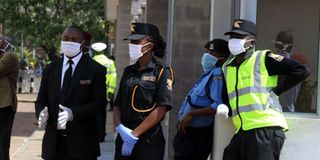MUTAVA: Guards unsung heroes of war on Covid-19

Security guards manning the gate of Holy Family Basilica in Nairobi on April 7, 2020. PHOTO | JEFF ANGOTE | NATION MEDIA GROUP
What you need to know:
- Private security firms have stepped up to the challenge of implementing government directives through provision of personal protective equipment to their guards.
- They update the National Emergency Response Committee on Coronavirus through monitoring and screening of weapons and tracking of persons with an abnormally high temperature.
A 700,000-strong workforce of guards in the private security providers continue to fill extra-routine roles since the outbreak of Covid-19 in the country.Though not gazetted essential service providers, guards play volunteer roles in crowd control to safeguard people — from ensuring the safety of residents and workers at homes, offices and factories and shoppers at malls to patrolling premises and taking the temperature of visitors or managing logistics for patients in quarantine centres and critical care units.Besides, the men and women in uniform play an outstanding role as frontline workers, complementing the medical emergency response, as guardrooms have been turned into triages to support the new safety policies and guidelines.GOVERNMENT DIRECTIVESPrivate security firms have stepped up to the challenge of implementing government directives through provision of personal protective equipment (PPEs) to their guards.In collaboration with the Ministry of Health, private security firms have trained guards in fighting the Covid-19 pandemic.They also update the National Emergency Response Committee on Coronavirus through monitoring and screening of weapons and tracking of persons with an abnormally high temperature.In partnership with entities such as the Private Security Congress, National Counter-Terrorism and OptiWatch, PSIA is developing a Covid-19 Command and Communication Centre for Private Security to keep guards safe through adoption of cloud technology on cellular networks to convey information and instructions.The President recently announced a Sh53.7 billion stimulus package to revive the economy, which has been slowed down by the pandemic, by supporting micro and small businesses and vulnerable Kenyans.As most businesses reopen, that will rekindle their partnership with private security firms for the safety and security of their homes and businesses, as well as back-to-business Covid disinfection and testing. HIGH RISK OFFICERS During these unprecedented times, the government should pivot on private security firms doubling as safety providers from Covid-19 alongside their traditional role of enhancing safety and loss prevention, which is no longer a sole focus.While guards often receive a supply of sanitisers, facemasks and other PPEs, they are high-risk protection officers.They require extra protection as they work in public and patrol deserted streets, especially during the overnight curfew, as most other people rest at home.Distinctively, guards work behind the scenes to support critical infrastructure against the rapidly spreading virus.They deserve to be regarded as frontline heroes who deserve recognition by the government.The government should set aside Covid-19 allowances for them, not only to improve their livelihood but also heighten the care package from contracting coronavirus infections.Yet, at the end of their respective shift, guards go back to their families, putting their loved ones at risk.A report by the United Kingdom’s Office for National Statistics (ONS) cites men working as security guards as having among the highest Covid-19 infection rates, with 45.7 deaths per 100,000.Let us safeguard those who guard us.Mr Mutava is the chairman, Protective Security Industry Association (PSIA). [email protected].



